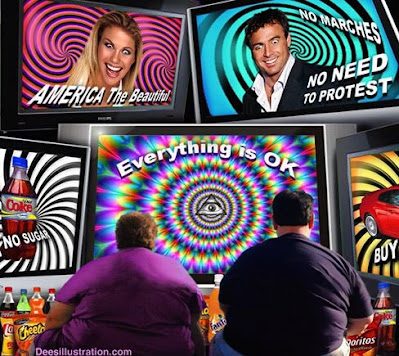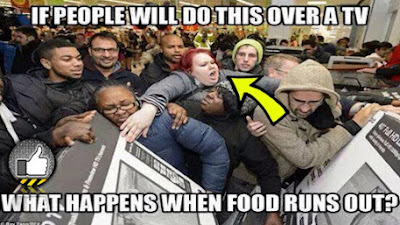"Where Do You Go in a Hurricane?"
by Jeff Thomas
"As a West Indian, I’ve lived through quite a few hurricanes in my time. My level of responsibility in each varied quite a bit. I was eight years old in my first hurricane and I thought it was great fun, as it was so exciting during the hurricane and, afterward, the landscape had changed so much that I had lots of new places to play.
On the other end of the scale, in 2004, my country, the Cayman Islands, experienced a Category 5 hurricane, with winds up to 200 miles per hour that sat on us without moving for 36 hours. I was responsible for ensuring that safety be provided for scores of my employees prior to the hurricane. After the storm, one of my companies took on the complete rebuilding of the country’s wholesale and retail food distribution facilities in order to ensure that the country’s population would have the most essential commodities - food and water. (A big change in level of responsibility over the years.)
In addition to having spent decades planning for hurricane damage, I’ve also spent decades as an economist, planning for major economic storms. In 1999, I determined that the world would experience what Doug Casey has termed a Greater Depression that would be more devastating than any economic event the world had ever seen. I predicted that it would happen in stages and that the final stage would be the most devastating. I would have been quite pleased to have been incorrect, but unfortunately, my predictions have come to pass. I believe we’re now quite close to the final destruction stage, a period that will lead to the collapse of many of the world’s formerly strongest economies, coinciding with a period of devastating warfare. In both the economic and warfare cases, those who are the world’s major players will believe that they’ll be able to control the extent of devastation and even profit from it, but events will go beyond their control and take on a life of their own.
As in the image above, there will not be just one, but multiple epicentres. Europe and North America will be hit the hardest economically. Next in line will be those countries, such as Japan, Australia, etc., that are the most closely linked economically with these centres. The next tier down will be those countries that are dependent on the centres, but more peripherally, such as Panama or Mexico. Finally, there will be those countries that are the least linked to the major centres, such as Uruguay or Thailand.
All countries will be impacted by the coming economic hurricane, but the effects will vary. Those in the US and Europe will experience the equivalent of a Category 5 hurricane. Those in Australia and Japan will experience a Category 4. Countries in the third tier will experience a Category 3, and those countries that are either distant from or the least economically dependent upon the epicentres will experience Category 2 or even Category 1 damage.
This is not mere speculation. In examining previous depressions and the last two world wars, we can see that those countries that were the least connected to events tended to fare well. This will hold true this time around as well.
When we turn on the television and the weatherman says that a hurricane is approaching, we have to make a decision. Do we trust in the hope that it might not pass directly over us? Do we question the severity of the storm as it’s being described to us? Should we plan to stay at home, as in a Category 1 or Category 2 storm, or should we plan to go to a local shelter as in a Category 3 or Category 4 storm? Or, do we believe we’ll be experiencing the devastation of a Category 5, in which case we’d pack our bags, wave goodbye to our home, and get as far away from the epicentre as possible?
Well, first, we’d better look at the categories, then, based on where we’re located, ask ourselves what we need to do. We’re presently already experiencing Category 1 conditions.
Category 1 Warfare: Minor civil disobedience and/or riots.
Category 1 Economics: Increased mortgage foreclosures, some strip-shop and mall closings, decreased spending overall.
Category 2 Warfare: Major civil disobedience, riots, and/or insurrection.
Category 2 Economics: The above, plus tariff wars, stock and bond market crashes.
Category 3 Warfare: Minor bombing and/or ground invasion.
Category 3 Economics: The above, plus minor inability of governments to pay entitlements, significant inflation, credit collapse.
Category 4 Warfare: Major bombing and/or ground invasion.
Category 4 Economics: The above, plus the end of the dollar as a reserve currency/end of the petrodollar, considerable inflation, short-term bank closures.
Category 5 Warfare: Nuclear destruction.
Category 5 Economics: The above, plus major inability of governments to pay entitlements, permanent closure of the majority of banks, currency collapse, confiscation of deposits, major internal capital controls.
The above descriptions are not by any means comprehensive. They represent basic categories, to which many details can and should be added.
So, what should your personal plan be? Well, if you’re located in one of the epicentres (the EU and US), you might devise a plan to head out to the country, if you have a destination that you either own or rent. Then, depending on the severity of the storm, you may survive the damage. (A rural area is the equivalent of a hurricane shelter.) However, if you’re dependent on your government for income, you may not be able to survive a Category 3 storm. Even if your income is independent of your government, you may not be able to survive a Category 4 or 5 storm, as you’ll still be under the control of a collapsing system.
The closer you are to an epicentre, the worse the damage promises to be to you personally. And the stronger the hurricane, the greater the damage. It’s important to remember that personal preparedness will help, but the worse the state your government, infrastructure, local businesses and neighbors will be in, the more you’ll be impacted by their condition, even if you’re personally prepared.
As an example, those who choose to sit out a Category 5 monetary and/or warfare hurricane in Uruguay would be likely to fare quite well, just as the Europeans who went there during the world wars. (Very few of them returned after the wars, having found a better life abroad.)
In a Category 4 hurricane, life would be likely to remain relatively stable in areas such as the southeastern provinces of Mexico. In a Category 3, New Zealand might just be manageable.
However, in order to assess your personal situation, it would be advisable to have another look at the categories above and decide for yourself what degree of damage is likely in the near future, then make a personal assessment as to whether you’re willing to chance experiencing that level of damage.
We’ve passed the point of whether there’ll be a hurricane; we just can’t be sure how severe it’ll be. The winds are already picking up and those who choose to make a move will need to do so soon."













.jpeg)























